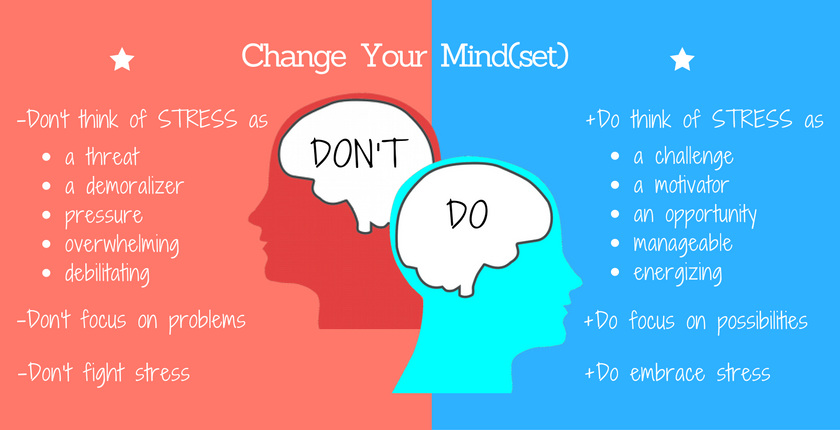By Shari Maser, Off-Campus Program Advisor
Many students and parents have shared that stress has a major impact on their lives. I have found that stress itself is not inherently problematic; the problem arises when you have a negative, destructive, or unproductive response to stress. One simple solution: change your mindset. This strategy is effective in all aspects of life, including education, sports, childbirth, and the workplace.
The Power of Mindset
Angela Duckworth and her colleagues’ research demonstrates that grit—the ability to focus on long-term goals instead of worrying about roadblocks to meeting them—has a positive impact on student success. Students who face severe stressors (such as homelessness, language barriers, and physical abuse) can become successful if they focus on overcoming these obstacles instead of staying focused on the stress caused by the obstacles themselves. The Mindset Works website cites extensive research by Carol Dweck and Lisa Blackwell, who demonstrated that if students are given the tools to develop a growth mindset that focuses on the belief they can get smarter through effort, they can achieve greater academic success than students with a fixed mindset that fosters anxiety about their potential lack of intelligence.
Using Mindset to Manage Stress
Mindset can alter the effects of stress in sports too. In his 2010 book Just Listen, Mark Goulston describes Tiger Woods’ successful response to stress thus: “instead of becoming distressed, he becomes…more focused. Tiger goes from stressed to alert to determined.” Tiger and his coach have identified certain mindset-changing phrases that, whenever he thinks or hears them, have the power to prevent his mind from reaching the point of “choking.” In a post on improving your soccer game, sports psychologist Dan Abrahams suggests athletes also try picturing their best games and/or their dream games to reduce performance anxiety.
When I was a childbirth educator, I taught women to practice saying personalized affirmations that could then be counted on to have a calming, focusing effect when verbalized during labor. Ray Williams cites research supporting self-affirmations on his blog, although he notes they must be accurate and resonate with the individual in order to be effective stress reducers; otherwise they can create new anxieties by “provoking contradictory thoughts.” For example, one step closer to meeting my baby might be an effective affirmation during labor but this is easy might be ineffective. Positive thoughts, when specific and appropriate to the individual, are powerful stress management tools.
Author Shawn Achor’s post titled “Make Stress Work for You” describes a study in which his research team shared with business managers “scientific findings that stress enhances the human brain and body…. The findings were significant: once an individual thought about stress as enhancing, instead of debilitating, they embraced the reality of their current stress level and used it to their advantage” at work. They felt less distress, fewer negative physical symptoms, more energetic, and more satisfied with their lives. In addition, their work productivity increased dramatically.
Resources for Students and Parents
If you or your student wants to experience the benefits of stress instead of the drawbacks, try changing your mindset! The following resources can help families explore the power of mindset as a stress management tool:
Books
- Mindset: The New Psychology of Success by Carol Dweck is a book that examines the impact of a growth mindset on success in business, school, and relationships.
- Soccer Tough: Simple Football Psychology Techniques to Improve Your Game by Dan Abrahams is a guidebook that explores techniques for harnessing stress in order to achieve success on the playing fields.
Videos
- “The Power of Believing that You Can Improve” is a TED Talk by psychologist Carol Dweck discussing the growth mindset versus the fixed mindset.
- “The Key To Success: GRIT” is a TED Talk by Angela Duckworth that discusses the power of grit in overcoming stress and other obstacles.
- “The Single Most Important Thing You Can Do for Your Stress” is a YouTube video by Dr. Mike Evans that explores the value of changing your thoughts and attitudes in order to reduce the negative effects of stress.
- “How to Make Stress Your Friend” by Kelly McGonigal is a TED Talk that explains how the physiological stress response can be helpful, and how the mindset that stress is bad for you can be harmful to your health.
Websites and More
- EduGuide is an educational program designed to help students develop “grit” by focusing their mindset on overcoming obstacles in order to achieve long-term goals.
- Mindset Works is a site dedicated to sharing and applying Dweck and Blackwell’s research about the growth mindset.
- “Embrace Your Stress: A Visual Idea” is an infographic that shows the impact of mindset on your positive or negative experience of stress.
Do you have any other tips or resources for managing stress that were not included in this post? Please share them below.








One Response
Check out my fellow author’s pithy post about a positive, productive mindset for writing revision: “Good?” “Bad?” No… Better.”